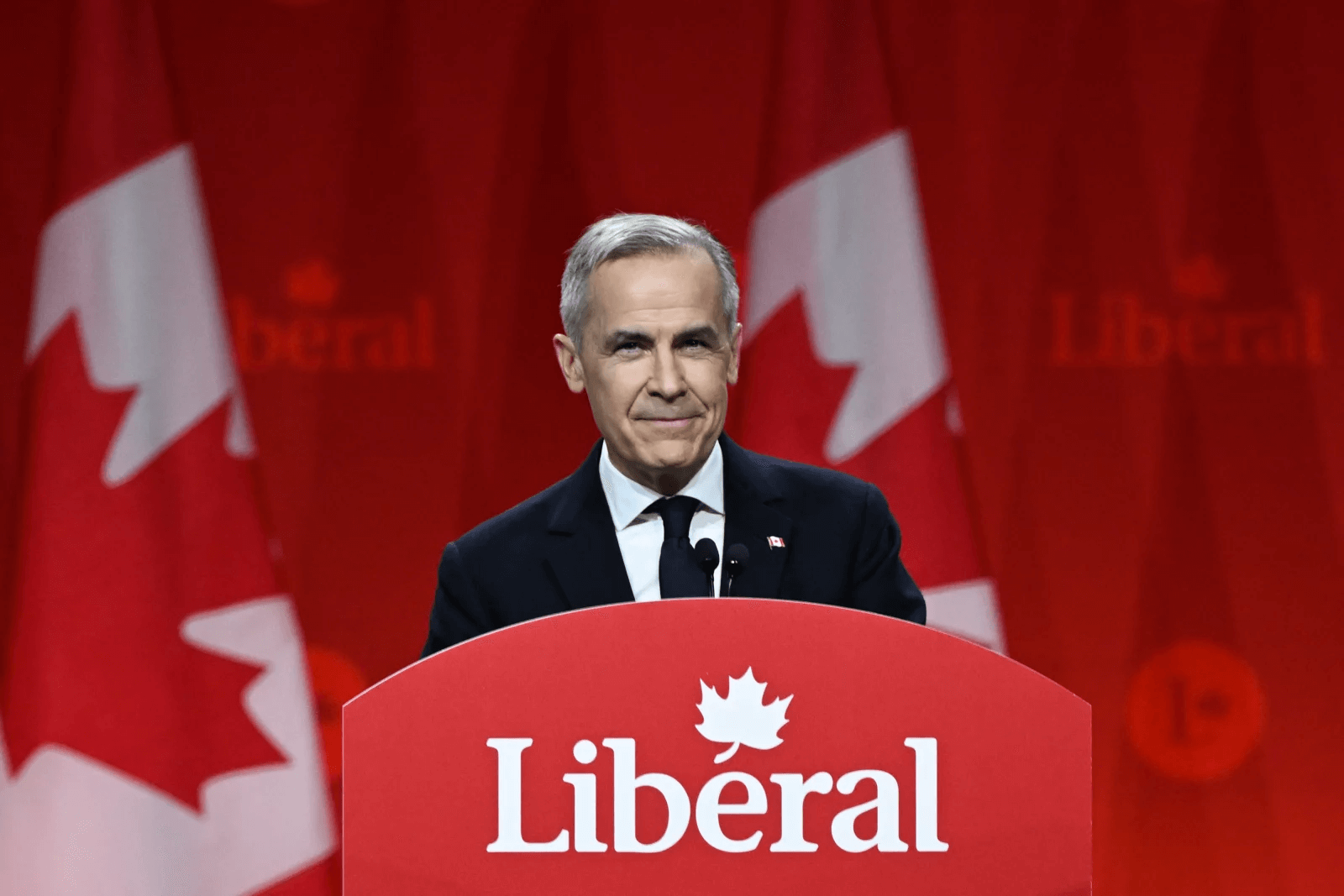
Author: Zen, PANews
On the morning of March 14 local time, Mark Carney, who won nearly 86% of the votes in the Liberal Party election, will officially take office as Prime Minister of Canada.
As an economic expert with a background as a central bank governor, 59-year-old Carney is also a political outsider, becoming the first Prime Minister in Canadian history who has never served as a Member of Parliament.
Since the resignation of the previous Prime Minister Justin Trudeau, U.S. President Donald Trump has begun imposing high tariffs on Canada and has repeatedly talked about making Canada the 51st state of the United States. Under normal circumstances, it would be difficult for Carney, as a political outsider, to qualify as a candidate, but his successful career as a central bank governor may make him the best choice to lead Canada in responding to the tariff crisis initiated by Trump. Carney believes he is the only one prepared to deal with Trump.
"I know how to manage a crisis… In this situation, you need experience in crisis management, you need negotiation skills," Carney said during last month's leadership debate.
"Pragmatic Banker": Former Governors of the Central Banks of Canada and the UK
In 1988, Carney graduated from Harvard University with a bachelor's degree in economics, and then continued his studies at the University of Oxford, earning a master's and a doctorate in economics. His career began at Goldman Sachs, where he worked for 13 years in its offices in London, Tokyo, New York, and Toronto. In the early 21st century, he returned to Canada and entered public service. In 2003, he was appointed Deputy Governor of the Bank of Canada, responsible for overseeing the country's monetary policy, and the following year became a senior deputy minister at the Department of Finance.
In February 2008, Carney began serving as Governor of the Bank of Canada, coincidentally during the global financial crisis. One month after taking office, Carney immediately lowered Canada's interest rates. This move, along with subsequent measures, helped boost market confidence, allowing Canada to recover from the crisis faster than most countries. Carney also received widespread acclaim for his handling of the financial crisis that year, creating a new emergency lending mechanism and rarely providing clear guidance on maintaining record-low interest rates for a specific period.
In 2013, Carney was recruited by then-Chancellor of the Exchequer George Osborne to become the first non-British Governor of the Bank of England. Due to his resemblance to Hollywood star George Clooney, Carney was humorously dubbed the "rock star central bank governor." After arriving in London, Carney was determined to bring change to the "stuffy" central bank with over 300 years of history. He introduced plastic banknotes and a new communication method called "forward guidance," aimed at helping investors better understand the direction of interest rates.
Carney also intervened in the heated debate surrounding Brexit, repeatedly warning of the potential risks Brexit posed to the UK economy, which led to accusations of "politicizing an independent central bank." However, Carney stated that discussing these risks was part of his duty. After the results of the Brexit referendum were announced in 2016, the pound fell sharply within hours. Carney delivered a televised address, assuring the market that the central bank would initiate liquidity support measures if necessary. In 2020, Carney left the Bank of England and subsequently served as the UN Special Envoy for Climate Action and Finance, continuing to work in the areas he emphasized during his tenure as governor: the need for financial markets to keep pace with the risks posed by the climate crisis.
On January 16, 2025, Carney officially announced his candidacy for the leadership of the Liberal Party. Although his path into politics is unusual, Carney told his supporters, "We are living in anything but ordinary times." Notably, Carney was born in Canada, and his grandparents immigrated from Ireland; he considers his Irish heritage an important part of his character. He obtained Irish citizenship in the 1980s and became a British citizen in 2018 while serving as Governor of the Bank of England. However, as a prime ministerial candidate, he stated his intention to renounce his British and Irish citizenship.
Calls for Strict Regulation of Crypto Assets, Support for CBDC
As a heavyweight in the economic field, Carney has been labeled a "Bitcoin critic" due to his negative comments on Bitcoin and cryptocurrencies. To date, Carney's observations and positions on crypto assets have mainly focused on his 2018 speech titled "The Future of Money."
"The fixed supply of cryptocurrencies like Bitcoin is not an advantage; rather, it is a serious flaw. Fundamentally, if these currencies were widely adopted, it would lead to deflationary pressures in the economy," Carney believes that rebuilding a global "virtual gold standard" would be an act of ignorance regarding monetary history.

Carney also stated that cryptocurrencies perform poorly as a store of value in the short term. "Over the past five years, Bitcoin's daily standard deviation (i.e., volatility) has been ten times that of the pound. Imagine if you borrowed £1,000 in student loans in Bitcoin last December to pay for your living expenses in pounds for the next year; you would now be down about £500. If you did this last September, you might have made £2,000 instead. It's like a lottery game." Additionally, he pointed out that the fundamental reason for people's skepticism about the long-term value of cryptocurrencies is that it remains unclear whether they can become effective mediums of exchange.
"Regardless of the merits or demerits of cryptocurrencies as money, regulators should proceed with caution to avoid stifling potential innovations that could enhance financial stability, support more innovative, efficient, and reliable payment services, and have broader application potential."
Carney believes that broadly adopting isolation strategies may miss significant opportunities brought about by the development of underlying payment technologies. A better approach is to regulate certain parts of the crypto asset ecosystem to combat illegal activities, promote market integrity, and protect the safety and soundness of the financial system. "It is time to bring the crypto asset ecosystem under the same standard framework as other financial systems."
Carney acknowledged the influence of the core technology behind cryptocurrencies. He believes that incorporating crypto assets into a regulatory framework could promote innovation and provide better services to the public. He pointed out that, in fact, crypto assets indicate the future of money in three ways:
- Revealing how money and payment methods need to adjust to meet the changing demands of society—especially the demand for decentralized peer-to-peer interactions;
- Enhancing the efficiency, reliability, and flexibility of payments through the potential of their underlying technology;
- Sparking discussions about whether central banks should provide central bank digital currencies (CBDCs) to the public.
Carney is a staunch supporter of CBDCs, having pointed out that in his envisioned future world, CBDCs will become the core of the economy. He believes that CBDCs offer higher security and a better user experience than cryptocurrencies and stablecoins, similar to his predecessor Trudeau. Trudeau has always held a critical attitude towards cryptocurrencies and tends to advocate for a Canadian dollar CBDC.
Canada has previously maintained an open attitude towards cryptocurrencies, viewing them as a commodity and requiring platforms operating in Canada to register and comply with securities laws, but has not shown support for cryptocurrencies. Carney's "critical attitude" towards Bitcoin also suggests that he will not align with the U.S. in advancing a strategic reserve of crypto assets.
Ideologically, Carney's push for CBDCs may simply be an effort to improve the economic situation of the country he loves, while opposition Conservative leader Pierre Poilievre firmly opposes this.
It is worth noting that Carney may not be able to serve as Prime Minister for the long term. According to polls, the opposition Conservative Party currently holds a slight lead ahead of the upcoming election scheduled for October 20 this year. However, due to rising anti-Trump sentiment and a lack of belief that populist Poilievre will stand up against Trump, Carney and the Liberal Party are also rapidly rising.
免责声明:本文章仅代表作者个人观点,不代表本平台的立场和观点。本文章仅供信息分享,不构成对任何人的任何投资建议。用户与作者之间的任何争议,与本平台无关。如网页中刊载的文章或图片涉及侵权,请提供相关的权利证明和身份证明发送邮件到support@aicoin.com,本平台相关工作人员将会进行核查。




